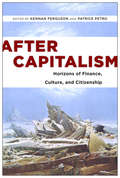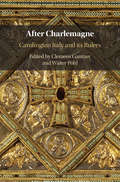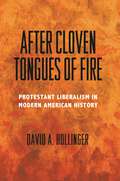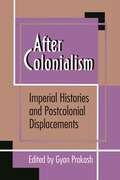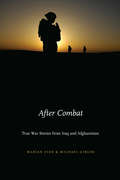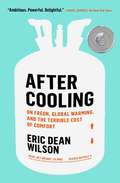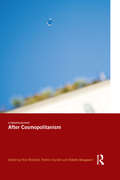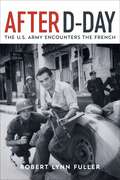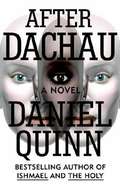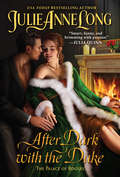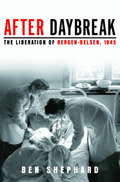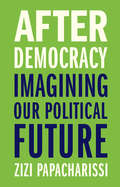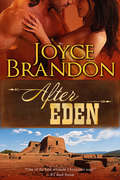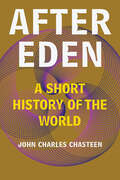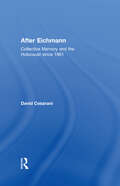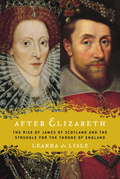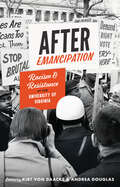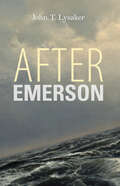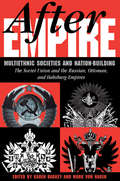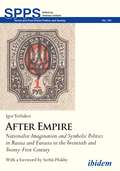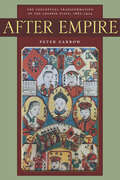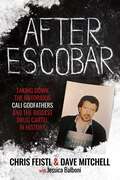- Table View
- List View
After Capitalism: Horizons of Finance, Culture, and Citizenship
by Andrew Ross A. Aneesh Geoff Mann Marcus Bullock Jeffrey Sommers Sherryl Vint Bernard C. Perley Cristina Venegas Esther Leslie Kennan Ferguson Niki Akhavan Patrice Petro Ivan AscherFrom Thomas Piketty to David Harvey, scholars are increasingly questioning whether we are entering into a post-capitalist era. If so, does this new epoch signal the failure of capitalism and emergence of alternative systems? Or does it mark the ultimate triumph of capitalism as it evolves into an unstoppable entity that takes new forms as it engulfs its opposition? After Capitalism brings together leading scholars from across the academy to offer competing perspectives on capitalism's past incarnations, present conditions, and possible futures. Some contributors reassess classic theorizations of capitalism in light of recent trends, including real estate bubbles, debt relief protests, and the rise of a global creditocracy. Others examine Marx's writings, unemployment, hoarding, "capitalist realism," and coyote (trickster) capitalism, among many other topics. Media and design trends locate the key ideologies of the current economic moment, with authors considering everything from the austerity aesthetics of reality TV to the seductive smoothness of liquid crystal. Even as it draws momentous conclusions about global economic phenomena, After Capitalism also pays close attention to locales as varied as Cuba, India, and Latvia, examining the very different ways that economic conditions have affected the relationship between the state and its citizens. Collectively, these essays raise provocative questions about how we should imagine capitalism in the twenty-first century. Will capitalism, like all economic systems, come to an end, or does there exist in history or elsewhere a hidden world that is already post-capitalist, offering alternative possibilities for thought and action?
After Charlemagne: Carolingian Italy and its Rulers
by Clemens Gantner Walter PohlAfter Charlemagne's death in 814, Italy was ruled by a succession of kings and emperors, all of whom could claim some relation to the Carolingians, some via the female line of succession. This study offers new perspectives on the fascinating but neglected period of Italy in the ninth century and the impact of Carolingian culture. Bringing together some of the foremost scholars on early medieval Italy, After Charlemagne offers the first comprehensive overview of the period, and also presents new research on Italian politics, culture, society and economy, from the death of Charlemagne to the assassination of Berengar I in 924. Revealing Italy as a multifaceted peninsula, the authors address the governance and expansion of Carolingian Italy, examining relations with the other Carolingian kingdoms, as well as those with the Italian South, the Papacy and the Byzantine Empire. Exploring topics on a regional and local level as well as presenting a 'big picture' of the Italian or Lombard kingdom, this volume provides new and exciting answers to the central question: How Carolingian was 'Carolingian Italy'?
After Cloven Tongues of Fire: Protestant Liberalism in Modern American History
by David A. HollingerThe important role of liberal ecumenical Protestantism in American historyThe role of liberalized, ecumenical Protestantism in American history has too often been obscured by the more flamboyant and orthodox versions of the faith that oppose evolution, embrace narrow conceptions of family values, and continue to insist that the United States should be understood as a Christian nation. In this book, one of our preeminent scholars of American intellectual history examines how liberal Protestant thinkers struggled to embrace modernity, even at the cost of yielding much of the symbolic capital of Christianity to more conservative, evangelical communities of faith.If religion is not simply a private concern, but a potential basis for public policy and a national culture, does this mean that religious ideas can be subject to the same kind of robust public debate normally given to ideas about race, gender, and the economy? Or is there something special about religious ideas that invites a suspension of critical discussion? These essays, collected here for the first time, demonstrate that the critical discussion of religious ideas has been central to the process by which Protestantism has been liberalized throughout the history of the United States, and shed light on the complex relationship between religion and politics in contemporary American life.After Cloven Tongues of Fire brings together in one volume David Hollinger's most influential writings on ecumenical Protestantism. The book features an informative general introduction as well as concise introductions to each essay.
After Colonialism: Imperial Histories and Postcolonial Displacements (Princeton Studies in Culture/Power/History)
by Gyan PrakashAfter Colonialism offers a fresh look at the history of colonialism and the changes in knowledge, disciplines, and identities produced by the imperial experience. Ranging across disciplines--from history to anthropology to literary studies--and across regions--from India to Palestine to Latin America to Europe--the essays in this volume reexamine colonialism and its aftermath. Leading literary scholars, historians, and anthropologists engage with recent theories and perspectives in their specific studies, showing the centrality of colonialism in the making of the modern world and offering postcolonial reflections on the effects and experience of empire. The contributions cross historical analysis of texts with textual examination of historical records and situate metropolitan cultural practices in engagements with non-metropolitan locations. Interdisciplinarity here means exploring and realigning disciplinary boundaries. Contributors to After Colonialism include Edward Said, Steven Feierman, Joan Dayan, Ruth Phillips, Anthony Pagden, Leonard Blussé, Gauri Viswanathan, Zachary Lockman, Jorge Klor de Alva, Irene Silverblatt, Emily Apter, and Homi Bhabha.
After Combat: True War Stories from Iraq and Afghanistan
by Marian Eide Michael GiblerApproximately 2.5 million men and women have deployed to Iraq and Afghanistan in the service of the U.S. War on Terror. Marian Eide and Michael Gibler have collected and compiled personal combat accounts from some of these war veterans. In modern warfare no deployment meets the expectations laid down by stories of Appomattox, Ypres, Iwo Jima, or Tet. Stuck behind a desk or the wheel of a truck, many of today’s veterans feel they haven’t even been to war though they may have listened to mortars in the night or dodged improvised explosive devices during the day. When a drone is needed to verify a target’s death or bullets are sprayed like grass seed, military offensives can lack the immediacy that comes with direct contact.After Combat bridges the gap between sensationalized media and reality by telling war’s unvarnished stories. Participating soldiers, sailors, marines, and air force personnel (retired, on leave, or at the beginning of military careers) describe combat in the ways they believe it should be understood. In this collection of interviews, veterans speak anonymously with pride about their own strengths and accomplishments, with gratitude for friendships and adventures, and also with shame, regret, and grief, while braving controversy, misunderstanding, and sanction. In the accounts of these veterans, Eide and Gibler seek to present what Vietnam veteran and writer Tim O’Brien calls a “true war story”—one without obvious purpose or moral imputation and independent of civilian logic, propaganda goals, and even peacetime convention.
After Cooling: On Freon, Global Warming, and the Terrible Cost of Comfort
by Eric Dean WilsonThis dazzlingly original work of literary nonfiction interweaves the science and history of the powerful refrigerant (and dangerous greenhouse gas) Freon with a haunting meditation on how to live meaningfully and morally in a rapidly heating world.In After Cooling, Eric Dean Wilson braids together air-conditioning history, climate science, road trips, and philosophy to tell the story of the birth, life, and afterlife of Freon, the refrigerant that ripped a hole larger than the continental United States in the ozone layer. As he traces the refrigerant&’s life span from its invention in the 1920s—when it was hailed as a miracle of scientific progress—to efforts in the 1980s to ban the chemical (and the resulting political backlash), Wilson finds himself on a journey through the American heartland, trailing a man who buys up old tanks of Freon stockpiled in attics and basements to destroy what remains of the chemical before it can do further harm. Wilson is at heart an essayist, looking far and wide to tease out what particular forces in American culture—in capitalism, in systemic racism, in our values—combined to lead us into the Freon crisis and then out. It&’s a story that offers a rare glimpse of environmental hope, suggesting that maybe the vast and terrifying problem of global warming is not beyond our grasp to face.
After Cosmopolitanism
by Rosi Braidotti Bolette Blaagaard Patrick HanafinAt a time when social and political reality seems to move away from the practice of cosmopolitanism, whilst being in serious need of a new international framework to regulate global interaction, what are the new definitions and practices of cosmopolitanism? Including contributions from leading figures across the humanities and social sciences, After Cosmopolitanism takes up this question as its central challenge. Its core argument is the idea that our globalised condition forms the heart of contemporary cosmopolitan claims, which do not refer to a transcendental ideal, but are rather immanent to the material conditions of global interdependence. But to what extent do emerging definitions of cosmopolitanism contribute to new representative democratic models of governance? The present volume argues that a radical transformation of cosmopolitanism is already ongoing and that more effort is needed to take stock of transformations which are both necessary and possible. To this end, After Cosmopolitanism calls for an understanding of cosmopolitanism that is more attentive to the material reality of our social and political situation and less focused on linguistic analyses of its metaphorical implications. It is the call for a cosmopolitanism that is also a cosmopolitics.
After D-Day: The U.S. Army Encounters the French
by Robert Lynn FullerAfter D-Day is one of a small but growing body of works that examine the Allied liberators of France. This study focuses on both the French experience of the U.S. Army and the American soldiers’ reaction to the French during the liberation and its immediate aftermath. Drawing on French and American archival materials, as well as dozens of memoirs, diaries, letters, and newspapers, Robert Lynn Fuller follows French and American interactions, starting in the skies over France in 1942 and ending with the liberation of Alsace in 1945. Fuller pays special attention to French life in the war zones, where living under constant shelling offered a miserable experience for those forced to endure it. The French stoically withstood those travails—sometimes inflicted by the Americans—when they saw their sacrifices as the price of liberation and victory over Germany. As Fuller shows, when the French did not believe afflictions brought by the Americans advanced the cause of success, their tolerance waned, sometimes dramatically. Fuller maintains that the Allied bombing of France was an important yet often overlooked chapter of World War II, one that inflicted more death and destruction than the ground war still to come. Yet the ground campaign, which began with the Allied invasion of Normandy, unleashed enormous violence that killed, injured, or rendered homeless tens of thousands of French civilians. Fuller examines French and American records of the fate of civilians in the principal battle zones, Normandy and Lorraine, as well as in overlooked liberated regions, such as Orléanais and Champagne, that largely escaped widespread damage and casualties. Despite French gratitude toward the Americans for the liberation of their country, relations began to cool in the fall and winter of 1944 as progress on the battlefield slowed and then appeared to reverse with the German offensive in the Ardennes. Revealing in stark detail the experiences of French civilians with the American military, After D-Day presents a compelling coda to our understanding of the Allied conquest of German-occupied France.
After Dachau
by Daniel QuinnDaniel Quinn, well known for Ishmael - a life-changing book for readers the world over - once again turns the tables and creates an otherworld that is very like our own, yet fascinating beyond words. Imagine that Nazi Germany was the first to develop an atomic bomb and the Allies surrendered. America was never bombed, occupied, or even invaded, but was nonetheless forced to recognize Nazi world dominance. The Nazis continued to press their campaign to rid the planet of "mongrel races" until eventually the world - from Capetown to Tokyo - was populated by only white faces. Two thousand years in the future people don't remember, or much care, about this distant past. The reality is that to be human is to be Caucasian, and what came before was literally ancient history having nothing to do with those then living. Now imagine that reincarnation is real, that souls migrate over time from one living creature to another, and that a soul that once animated an American black woman living at the time of World War II now animates an Aryan in Quinn's new world, and that due to a traumatic accident memories of this earlier incarnation assert themselves. Compared by readers and critics alike to 1984 and Brave New World, After Dachau is a new dystopian classic with much to say about our own time, and the dynamics of human history.
After Dark with the Duke: Palace of Rogues (The Palace of Rogues #4)
by Julie Anne LongSparks fly when a daring diva clashes with an ice-cold war hero in the newest thrilling romance in USA Today bestselling author Julie Anne Long’s Palace of Rogues series.She arrives in the dead of night, a mob out for blood at her heels: Mariana Wylde, the “Harlot of Haywood Street,” an opera diva brought low by a duel fought for her favors. But the ladies of the Grand Palace on the Thames think they can make a silk purse from scandal: They’ll restore her reputation and share in her triumph...provided they can keep her apart from that other guest. Coldly brilliant, fiercely honorable, General James Duncan Blackmore, the Duke of Valkirk, is revered, feared, desired...but nobody truly knows him. Until a clash with a fiery, vulnerable beauty who stands for everything he scorns lays him bare. It’s too clear the only cure for consuming desire is conquest, but their only chance at happiness could lead to their destruction. The legendary duke never dreamed love would be his last battleground. Valkirk would lay down his life for Mariana, but his choice is stark: risk losing her forever, or do the one thing he vowed he never would...surrender.
After Daybreak
by Ben Shephard"I find it hard even now to get into focus all these horrors, my mind is really quite incapable of taking in everything I saw because it was all so completely foreign to everything I had previously believed or thought possible." British Major Ben Barnett's words echoed the sentiments shared by medical students, Allied soldiers, members of the clergy, ambulance drivers, and relief workers who found themselves utterly unprepared to comprehend, much less tend to, the indescribable trauma of those who survived at the Bergen-Belsen concentration camp.The liberation of Bergen-Belsen by the British in April 1945 was a defining point in history: the moment the world finally became inescapably aware of the Holocaust. But what happened after Belsen was liberated is still a matter of dispute. Was it an epic of medical heroism or the culmination of thirteen years of indifference to the fate of Europe's Jews? This startling investigation by acclaimed documentary filmmaker and historian Ben Shephard draws on an extraordinary range of materials-contemporary diaries, military documents, and survivors' testimonies-to reconstruct six weeks at Belsen beginning on April 15, 1945, and reveals what actually caused the post-liberation deaths of nearly 14,000 concentration camp inmates who might otherwise have lived. Why did it take almost two weeks to organize a proper medical response? Why were the medical teams sent to Belsen so poorly equipped? Why, when specialists did arrive, did they get so much of the medicine plain wrong?For the first time, Shephard explores the humanitarian and medical issues surrounding the liberation of the camp and provides a detailed, illuminating account that is far more complex than had been previously revealed. This gripping book confronts the terrifying aftermath of war with questions that still haunt us today.From the Hardcover edition.
After Defeat: How the East Learned to Live with the West (Cambridge Studies in International Relations)
by Ayşe ZarakolNot being of the West; being behind the West; not being modern enough; not being developed or industrialized, secular, civilized, Christian, transparent, or democratic - these descriptions have all served to stigmatize certain states through history. Drawing on constructivism as well as the insights of social theorists and philosophers, After Defeat demonstrates that stigmatization in international relations can lead to a sense of national shame, as well as auto-Orientalism and inferior status. Ayşe Zarakol argues that stigmatized states become extra-sensitive to concerns about status, and shape their foreign policy accordingly. The theoretical argument is supported by a detailed historical overview of central examples of the established/outsider dichotomy throughout the evolution of the modern states system, and in-depth studies of Turkey after the First World War, Japan after the Second World War, and Russia after the Cold War.
After Democracy: Imagining Our Political Future
by Zizi PapacharissiWhat do ordinary citizens really want from their governments? Democracy has long been considered an ideal state of governance. What if it&’s not? Perhaps it is not the end goal but, rather, a transition stage to something better. Drawing on original interviews conducted with citizens of more than thirty countries, Zizi Papacharissi explores what democracy is, what it means to be a citizen, and what can be done to enhance governance. As she probes the ways governments can better serve their citizens and evolve in positive ways, Papacharissi gives a voice to everyday people, whose ideas and experiences of capitalism, media, and education can help shape future governing practices. This book expands on the well-known difficulties of realizing the intimacy of democracy in a global world—the &“democratic paradox&”—and presents a concrete vision of how communications technologies can be harnessed to implement representative equality, information equality, and civic literacy.
After Eden
by Joyce BrandonA dangerous love triangle sets the Arizona Territory ablaze “with all the passion, excitement and savagery that romance readers could ever hope to see” (RT Book Reviews). Teresa Garcia-Lorca grew up as the favorite daughter of the infamous Mexican revolutionary “El Gato Negro.” But when the truth of her paternity comes out, El Gato flies into a jealous rage, and Teresa must flee for her life. When she learns that her real father has died, leaving her part owner of his Tombstone ranch, her only hope for survival is to join a family she never knew. But not everyone on the ranch is happy for Teresa’s homecoming. As the spoiled daughter of her wealthy rancher father, Judy Burkhart got everything—and every man—she ever wanted. And she’s determined to add sexy ranch hand Johnny Brago to the list. But Judy’s world shatters when her father’s will names Teresa, not her, as his real daughter. And when Teresa and Johnny discover an undeniable passion, Judy will do whatever it takes to reclaim what she believes to be hers. But Teresa has never known a love like the one she’s found with Johnny. And after evading El Gato’s vicious men, she’s determined never to run from her home again. “An intricately woven story . . . a dramatic ending asserts the triumph of love.” —Publishers Weekly “This is the real West . . . one of the best westerns I have ever read.” —RT Book Reviews
After Eden: A Short History of the World
by John Charles ChasteenTo solve the problems of the twenty-first century, historian John Charles Chasteen argues that we must first know our shared human story. In After Eden, prominent Latin American historian John Chasteen presents a concise down-to-earth, fast-paced narrative of world history, from the Big Bang to the present, animated by stories of people from all walks of life and enriched by insightful analysis and the author’s extensive world travel. To tackle today’s major problems of global inequality and environmental degradation, Chasteen argues that we must first understand our shared past, both the violent and cruel dimensions—“humanity’s inhumanity to itself”—and the aspirational ones—the creation of universal religions and ethical systems; the birth of the ideas of individual liberty and freedom; the resistance to the excesses of global capitalism; the civil rights and decolonization movements; and the environmental and social justice movements of today. For Chasteen, ultimate success hinges on our ability to recognize from our past experiences what is needed for us to live cooperatively and, most critically, the ways we educate our young people.
After Eichmann: Collective Memory and Holocaust Since 1961
by David CesaraniIn 1961 Adolf Eichmann went on trial in Jerusalem for his part in the Nazi persecution and mass murder of Europe’s Jews. For the first time a judicial process focussed on the genocide against the Jews and heard Jewish witnesses to the catastrophe. The trial and the controversies it caused had a profound effect on shaping the collective memory of what became ‘the Holocaust’. This volume, a special issue of the Journal of Israeli History, brings together new research by scholars from Europe, Israel and the USA.
After Elizabeth
by Leanda De LisleA brilliant history of the succession of James I of England, and the shifting power and lethal politics that brought him to the throne. In the dawn of the 17th century when Mary Queen of Scots was dead and Elizabeth I grown old, the eyes of the English turned to Mary's son, James VI of Scotland. Leanda de Lisle's book focuses on the intense period of raised hopes and dashed expectations between Christmas 1602 and Christmas 1603, during which Elizabeth died, James was crowned and the ancient enemies of England and Scotland were ruled by one monarch for the first time. With its focus on a narrow space of time, this immensely readable history illuminates a wider period, telling in dramatic detail how the suffocating conservatism of Elizabeth's rule was replaced with that of the energetic, James. It is a story in which fortunes were made and lives lost as courtiers vied for wealth and influence. As well as painting a superb portrait of Court life, de Lisle explores the forces that shaped James's life, his separation from his mother and the violence of his Scottish kingdom; his marriage to the vivacious Anna of Denmark and the failed rebellions, government corruption and religious persecution which set the stage for James's accession to the throne of England. Drawing extensively from original sources and contemporary accounts this vivid account of the cusp of the Tudor and Stuart centuries brings to life a period of glamour and intrigue that marked the beginning of a new age.
After Elizabeth: The Rise of James of Scotland and the Struggle for the Throne of England
by Leanda De LisleMany volumes have been written about the long reign of Elizabeth I. Now, for the first time, comes a brilliant new work that focuses on the critical year her reign ended, a time in which England lost its childless queen and a Machiavellian struggle ensued to find her successor.December 1602. After forty-four years on the throne, Queen Elizabeth is in decline. The formidable ruler whose motto is Semper eadem (I never change) has become a dithering old woman, missing teeth and wearing makeup half an inch thick. The kingdom has been weakened by the cost of war with Spain and the simmering discontent of both the rich and the poor. The stage has been set, at long last, for succession. But the Queen who famously never married has no heir.Elizabeth’s senior relative is James VI of Scotland, Protestant son of Elizabeth’s cousin Mary Queen of Scots. But as a foreigner and a Stuart, he is excluded from the throne under English law. The road to and beyond his coronation will be filled with conspiracy and duplicity, personal betrayals and political upheavals.Bringing history to thrilling life, Leanda de Lisle captures the time, place, and players as never before. As the Queen nears the end, we witness the scheming of her courtiers for the candidates of their choice; blood-soaked infighting among the Catholic clergy as they struggle to survive in the face of persecution; the widespread fear that civil war, invasion, or revolution will follow the monarch’s death; and the signs, portents, and ghosts that seem to mark her end. Here, too, are the surprising and, to some, dismaying results of James’s ascension: his continuation of Elizabeth’s persecution of Catholics, his desire to unite his two kingdoms into a new country called Britain, and the painful contrast between the pomp and finery of Elizabeth’s court and the begrimed quality of his own.Around the old queen and the new king, swirl a cast of unforgettable characters, including Arbella Stuart, James’s ambitious and lonely first cousin; his childish, spoiled rival for power, Sir Walter Raleigh, who plotted to overthrow the king; and Sir John Harrington, Elizabeth’s wily godson, who switched his loyalties to James long before the queen’s death. Courtesy of Leanda de Lisle’s keenly modern view of this tumultuous time, we are given intimate insights into of political power plays and psychological portraits relevant to our own era. After Elizabeth is a unique look at a pivotal year–and a dazzling debut for an exciting new historian.From the Hardcover edition.
After Elizabeth: The Rise of James of Scotland and the Struggle for the Throne of England
by Leanda De LisleMany volumes have been written about the long reign of Elizabeth I. Now, for the first time, comes a brilliant new work that focuses on the critical year her reign ended, a time in which England lost its childless queen and a Machiavellian struggle ensued to find her successor.December 1602. After forty-four years on the throne, Queen Elizabeth is in decline. The formidable ruler whose motto is Semper eadem (I never change) has become a dithering old woman, missing teeth and wearing makeup half an inch thick. The kingdom has been weakened by the cost of war with Spain and the simmering discontent of both the rich and the poor. The stage has been set, at long last, for succession. But the Queen who famously never married has no heir.Elizabeth’s senior relative is James VI of Scotland, Protestant son of Elizabeth’s cousin Mary Queen of Scots. But as a foreigner and a Stuart, he is excluded from the throne under English law. The road to and beyond his coronation will be filled with conspiracy and duplicity, personal betrayals and political upheavals.Bringing history to thrilling life, Leanda de Lisle captures the time, place, and players as never before. As the Queen nears the end, we witness the scheming of her courtiers for the candidates of their choice; blood-soaked infighting among the Catholic clergy as they struggle to survive in the face of persecution; the widespread fear that civil war, invasion, or revolution will follow the monarch’s death; and the signs, portents, and ghosts that seem to mark her end. Here, too, are the surprising and, to some, dismaying results of James’s ascension: his continuation of Elizabeth’s persecution of Catholics, his desire to unite his two kingdoms into a new country called Britain, and the painful contrast between the pomp and finery of Elizabeth’s court and the begrimed quality of his own.Around the old queen and the new king, swirl a cast of unforgettable characters, including Arbella Stuart, James’s ambitious and lonely first cousin; his childish, spoiled rival for power, Sir Walter Raleigh, who plotted to overthrow the king; and Sir John Harrington, Elizabeth’s wily godson, who switched his loyalties to James long before the queen’s death. Courtesy of Leanda de Lisle’s keenly modern view of this tumultuous time, we are given intimate insights into of political power plays and psychological portraits relevant to our own era. After Elizabeth is a unique look at a pivotal year–and a dazzling debut for an exciting new historian.From the Hardcover edition.
After Emancipation: Racism and Resistance at the University of Virginia (The American South Series)
Assessing a university&’s legacy in the age of segregation This anthology reckons with the University of Virginia&’s post-emancipation history of racial exploitation. Its fifteen essays highlight the many forms of marginalization and domination at Virginia&’s once all-white flagship university to uncover the patriarchal, nativist, and elitist assumptions that shaped university culture through the late nineteenth century and well into the twentieth. Including community responses ranging from personal reflections to interviews with local leaders to poems, this accessible volume will be essential reading for anyone with ties to UVA or to Charlottesville, as well as for anyone concerned with the legacy of slavery and segregation in America&’s universities.
After Emerson (American Philosophy)
by John T. LysakerThe author of Emerson & Self-Culture shares essays covering such themes as identity, experience, ethics, poetry, philosophy, history, and race.John T. Lysaker works between and weaves together questions and replies in philosophical psychology, Emerson studies, and ethics in this book of deep existential questioning. Each essay in this atypical, philosophical book employs recurring terms, phrases, and questions that characterize our contemporary age. Setting out from the idea of where we are in an almost literal sense, Lysaker takes readers on an intellectual journey into thematic concerns and commitments of broad interest, such as the nature of self and self-experience, ethical life, poetry and philosophy, and history and race. In the manner of Emerson, Cavell, and Rorty, Lysaker’s vibrant writing is certain to have a transformative effect on American philosophy today.“An original and stimulating book, manifesting a level of reflection and existential concern of the highest order. It is intellectually and personally honest.” —Robert E. Innis, author of Susanne Langer in Focus“There is something fresh and hence refreshing in the manner in which John T. Lysaker takes up familiar topics. He shows, with both arresting details and an evolving design, how the conduct of life (to use Emerson’s expression) demands a form of thought frequently at odds with contemporary fashions and preoccupations, with institutionally entrenched approaches and all too rigidly policed discourses.” —Vincent Colapietro, author of Experience, Interpretation, and Community“Acknowledged as one of his generations premier Emerson scholars, Lysaker goes beyond his earlier work, Emerson & Self-Culture . . . [T]he writing is stimulating, vibrant, challenging, risky, and fecund. Recommended.” —D. B. Boersma, Choice
After Empire: Multiethnic Societies And Nation-building: The Soviet Union And The Russian, Ottoman, And Habsburg Empires
by Karen BarkeyThe Soviet Union was hardly the first large, continuous, land-based, multinational empire to collapse in modern times. The USSR itself was, ironically, the direct result of one such demise, that of imperial Russia, which in turn was but one of several other such empires that did not survive the stresses of the times: the Austro-Hungarian Empire of the Habsburgs and the Ottoman Empire.This ambitious and important volume brings together a group of some of the most outstanding scholars in political science, history, and historical sociology to examine the causes of imperial decline and collapse. While they warn against facile comparisons, they also urge us to step back from the immediacy of current events to consider the possible significance of historical precedents.Is imperial decline inevitable, or can a kind of imperial stasis be maintained indefinitely? What role, if any, does the growth of bureaucracies needed to run large and complex political systems of this type play in economic and political stagnation? What is the balance of power" between the centre and the peripheries, between the dominant nationality and minorities? What coping mechanisms do empires tend to develop and what influence do these have? Is modernization the inexorable source of imperial decline and ultimate collapse? And what resources, including the imperial legacy, are available for political, social, and economic reconstruction in the aftermath of collapse? These are just a few of the tantalizing questions addressed by the contributors to this fascinating and timely volume.
After Empire: Nationalist Imagination and Symbolic Politics in Russia and Eurasia in the Twentieth and Twenty-First Century (Soviet And Post-soviet Politics And Society Ser. #191)
by Igor TorbakovIgor Torbakov explores the nexus between various forms of Russian political imagination and the apparently cyclic process of the decline and fall of Russia’s imperial polity over the last hundred years. While Russia’s historical process is by no means unique, two features of its historical development stand out. First, the country’s history is characterized by dramatic political discontinuity. In the past century, Russia changed its “historical skin” three times: following the disintegration of the Tsarist Empire accompanied by violent civil war, it was reconstituted as the communist USSR, whose breakup a quarter century ago led to the emergence of the present-day Russian Federation. Each of the dramatic transformations in the twentieth century powerfully affected the notion of what “Russia” is and what it means to be Russian. Second, alongside Russia’s political instability, there is, paradoxically, a striking picture of geopolitical stability and of remarkable longevity as an imperial entity. At least since the beginning of the eighteenth century, “Russia” has been a permanent geopolitical fixture on Europe’s northeastern margins with its persistent pretense to the status of a great power. Against this backdrop, the book’s three sections investigate (a) the emergence and development of Eurasianism as a form of (post-)imperial ideology, (b) the crucial role Ukraine has historically played for the Russians’ self-understanding, and (c) contemporary Russian elites’ exercises in historical legitimation.
After Empire: The Conceptual Transformation of the Chinese State, 1885-1924
by Peter ZarrowFrom 1885-1924, China underwent a period of acute political struggle and cultural change, brought on by a radical change in thought: after over 2,000 years of monarchical rule, the Chinese people stopped believing in the emperor. These forty years saw the collapse of Confucian political orthodoxy and the struggle among competing definitions of modern citizenship and the state. What made it possible to suddenly imagine a world without the emperor? After Empiretraces the formation of the modern Chinese idea of the state through the radical reform programs of the late Qing (1885-1911), the Revolution of 1911, and the first years of the Republic through the final expulsion of the last emperor of the Qing from the Forbidden City in 1924. It contributes to longstanding debates on modern Chinese nationalism by highlighting the evolving ideas of major political thinkers and the views reflected in the general political culture. Zarrow uses a wide range of sources to show how "statism" became a hegemonic discourse that continues to shape China today. Essential to this process were the notions of citizenship and sovereignty, which were consciously adopted and modified from Western discourses on legal theory and international state practices on the basis of Chinese needs and understandings. This text provides fresh interpretations and keen insights into China's pivotal transition from dynasty to republic.
After Escobar
by Dave Mitchell Chris Feistl Jessica BalboniRenowned DEA agents Chris Feistl and Dave Mitchell tell the incredible true story of how they helped dismantle the world&’s single most powerful crime syndicate, as featured in Season 3 of the hit Netflix series Narcos.By the early 1990s, Colombia&’s Cali cartel had become what the former head of the DEA Thomas Constantine referred to as &“The biggest and most powerful crime syndicate in history.&” Responsible for nearly 85% of the cocaine that reached U.S. soil and 90% worldwide, they were untouchable, earning billions of dollars all while maintaining their reputation as &‘The Godfathers of Cali&” and brazenly corrupting thousands of Colombian authorities and government officials, even &“buying&” the outcome of the 1994 presidential election. In 1994, the DEA sent young operatives Chris Feistl and Dave Mitchell to Colombia with one formidable task: help Colombian authorities take down the ruthless leaders of the brutal Cali cartel. Not any easy job for two men who looked more like tall, lanky surfers than DEA agents: standing well over six feet tall and only six years removed from the DEA Academy, they were the epitome of conspicuous in a city where most residents rarely, if ever, saw an American in person. Many of their colleagues feared for their safety, openly questioning their ability to blend in. Their almost three-year journey would lead them from the bureaucratic halls of the U.S. Embassy to the violent streets of Cali and deep into its rural sugar cane fields, on high alert day and night as they dodged deadly cartel assassins and oftentimes worked unilaterally to battle the unprecedented corruption within Colombia&’s security forces. Over time their relentless efforts began to slowly degrade the godfathers&’ defenses and weaken their infrastructure.
